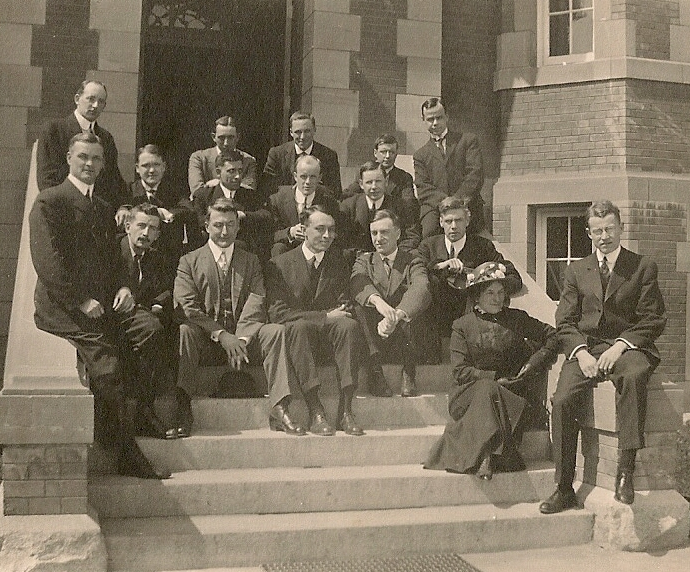
Ruby Clements, bottom right, with her classmates from the 1915 law class.
The story of Ruby Clements becoming the first woman admitted to the bar in Alberta is an odd one because it contrasts sharply with the experience of women elsewhere in Canada.
At the end of the 1800s, it was widely accepted that the common law imposed a disability on women which prevented them from being lawyers and taking on other public roles, says Sandra Petersson, executive director of the Alberta Law Reform Institute.
For example, although Toronto's Clara Brett Martin became the first female lawyer in the British Empire in 1897, she first had to battle to become a law student, and then enlist the help of the Ontario premier and the wife of the Governor General to change legislation to remove the disability before she could join the Law Society of Upper Canada.
Yet in Alberta, women were admitted to law studies and to the bar without any formal opposition.
"Those admissions were likely invalid at the time," says Petersson, who wrote about this history in the Canadian Journal of Women and the Law, in 1997. "The Law Society simply assumed they could admit women. Luckily, no one raised that common law disability, otherwise Alberta women would have faced the same barriers to become lawyers."
Still, progress for women in the Alberta legal profession was slow.
Erella Laurena Leona Alexander was admitted as a student-at-law in Calgary in 1896; Grace McLeod enrolled as a student-at-law in 1909; and Bessie Hosking Nichols, the third woman to enrol as a student-at-law, began her three years of study in 1910. However, there is no record of Alexander taking her final examination, and neither McLeod nor Nichols completed their articles.
While Clements became the first woman qualified to practise law in Alberta in September 1915, it wasn't until the Sex Disqualification (Removal) Act of 1930 passed - 15 years after she was called to the bar - that her admission was retroactively validated.
Clements was born into a hardworking family in Paisley, Ont., on April 27, 1886, and moved west with her family to Strathcona, Northwest Territories (now Edmonton), in 1901.
From a young age, Clements was taught the importance of hard work and the value of an education. When the family moved again, to Vegreville in 1903, her father, William Clements, opened a general store - Clements and Son - as well as Vegreville's first post office. He was also the first chair of the school board and the town's first full-time mayor.
After graduating high school in 1905, Clements enrolled at McMaster University in Hamilton, majoring in economics.
She had already decided to go to law school by the time she received her BA in 1912, having written to the Law Society of Alberta in 1911 regarding requirements to study law. The following year, she requested admission as a graduate student.
Clements articled with Frederic Augustus Morrison at the firm of Landry Morrison in Vegreville. At the time, the Law Society required three years of articles, attendance at lectures and the successful completion of three exams, offered by the University of Alberta under an agreement with the Law Society (the Faculty of Law wasn't officially established until 1921). Clements also took additional courses to qualify for an LLB from U of A.
In 1915, she was one of 30 students to pass her final examination, the first woman to complete requirements for admission to the bar in Alberta, and the first woman to receive an LLB from the university.
Yet Clements never did practise law. By 1915 Edmonton had fallen into recession. The real estate market crashed and the population dropped dramatically. Setting up practice would have been a significant challenge for any new lawyer.
She married businessman Chester Gainer and remained an influential member of her community. She was the provincial vice-president of the Women's Christian Temperance Union, and in 1939 the vice-president of the Local Council of Women in Edmonton. She was president of the Women's Canadian Club from 1943 to 1945, and in 1943 was the first vice-president of the Women's Missionary Auxiliary of the Baptist Union of Western Canada. She died in 1956.
Clements paved the way for female lawyers in Alberta. By 2018, 51 per cent of the UAlberta Law graduating class were women.
Additionally, the Lillian Ruby Clements Trailblazer Award was established by the Alberta Civil Trial Lawyers Association Women's Legal Forum. The award celebrates the achievements and leadership of women lawyers and judges who have broken barriers and advanced the role of women in the profession.